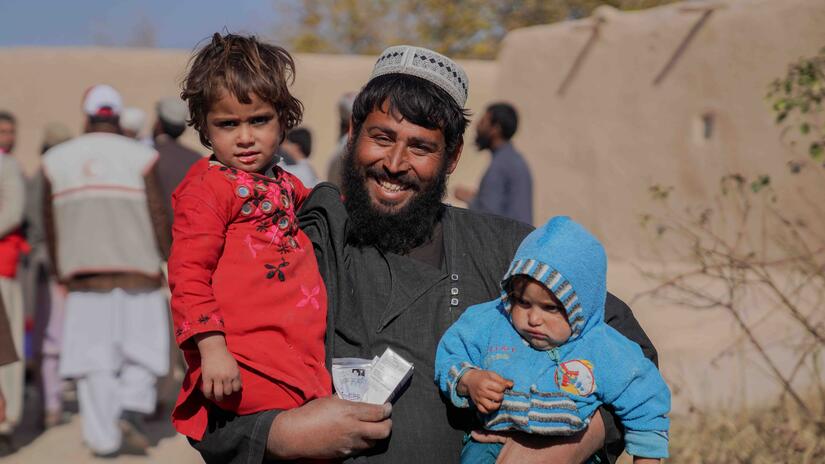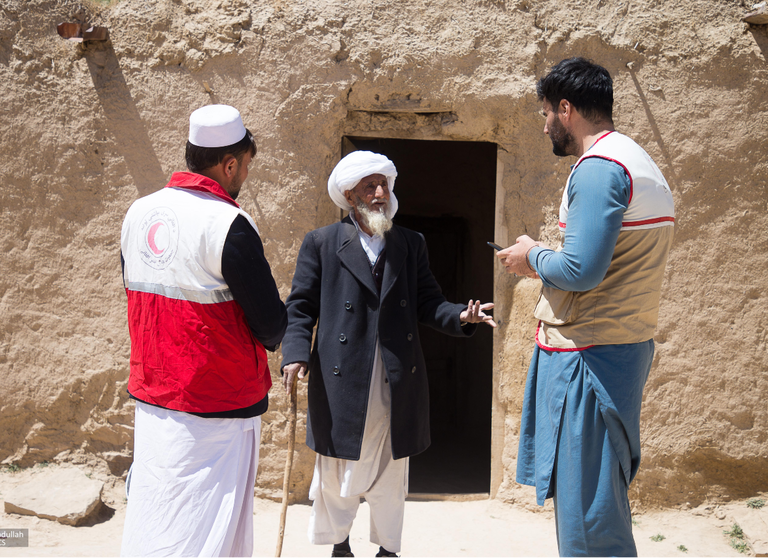Muhammad Taher, a 40-year-old farmer and his family of eight children, is among the many families who have received life-saving immunization and medical care from Afghan Red Crescent Society mobile health teams.
Getting any sort of healthcare in Muhammad Taher’s district, Nahr Seraj of Helmand province, has been a tremendous challenge for decades. Nahr Seraj is four-hour drive from the nearest city, Lashkar Gah, southwestern Afghanistan.
For more than two decades now, public health care services in Afghanistan have relied on international financing while the last mile is delivered by various local humanitarian actors.
As the IFRC marks World Immunization Week 2024, which this year has a theme of Humanly Possible, the Afghan Red Crescent’s efforts to bring healthcare and immunization to remote rural areas is a impressive example of what can be achieved through consistent, dedicated local presence.
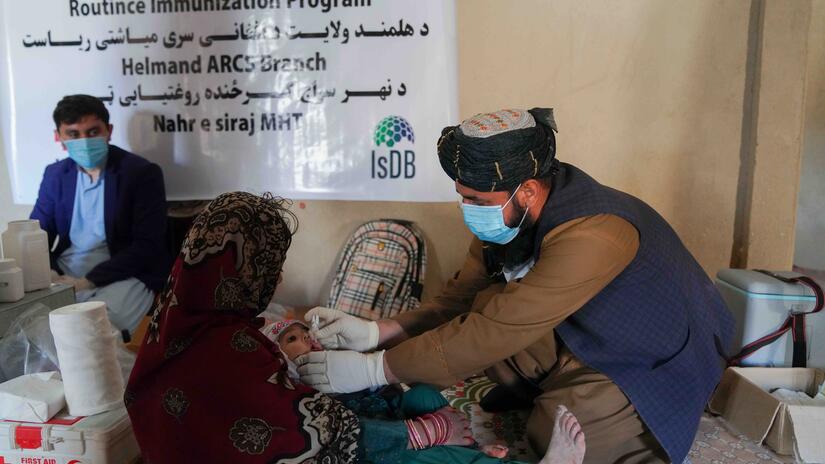
An Afghan Red Crescent mobile team member provides immunization for an infant during an immunization drive in July 2023.
Photo: Meer Abdullah Rasikh/IFRC
Following the historic events that took place in August 2021, a major strain was put on the public health system as donors reorganized their financing models. The transition stretched the system significantly, but a total collapse was prevented through solutions which have enabled continuation of primary and secondary health services.
The Afghan Red Crescent Society is one of the local actors engaged in the delivery of primary and secondary health services in the country.
The National Society’s network of more than 200 health facilities includes 97 mobile health teams, 46 fixed basic health clinics, 28 sub health clinics, one comprehensive health clinic, and a district hospital. There are also more than 40 health camps supporting routine immunization efforts in various provinces.
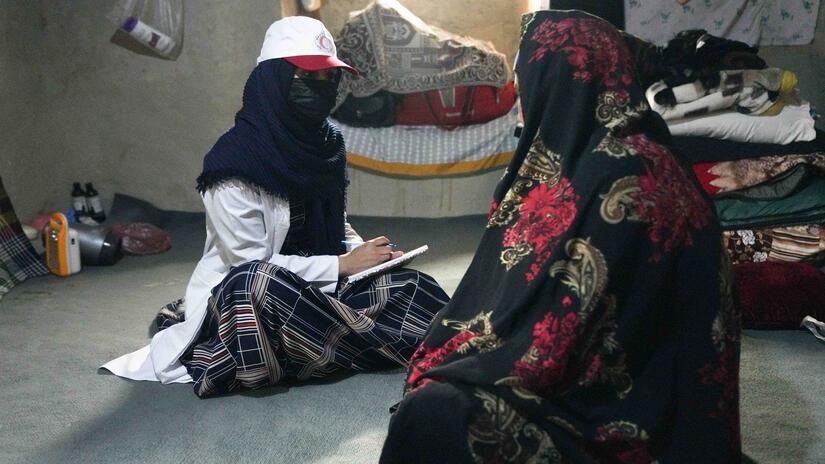
Women make up a large portion of the mobile health clinic teams and they play a very important role, particularly regarding the health of women in remote communities. Here a woman staff member of the Afghan Red Crescent mobile health team does a consultation with a woman in Helmand province.
Photo: Meer Abdullah Rasikh/IFRC
Life-saving pre-natal care, medication and vaccination
The ongoing economic hardship means that Taher, and countless others, are unable to pay medical bills or even reach the health facilities located in Afghan cities.
"My pregnant wife and three of my little girls fell ill recently and needed urgent healthcare but I couldn't afford to take them to the city hospital,” said Taher.
“I approached my relatives and neighbours to lend me some money for [the trip], but none were able to help because they too were undergoing tremendous economic hardship.
“Finally, one of my relatives mentioned that an Afghan Red Crescent Society mobile health team was operating in our village and suggested that I take my sick family members there.
“Without wasting any time, I rushed back home and took my wife and children to where the teams were located. Thankfully my wife was able to get her prenatal checkup done by a midwife, my sick daughters were examined by a doctor and received free medication, and my other children got vaccinated,” he explained in relief.
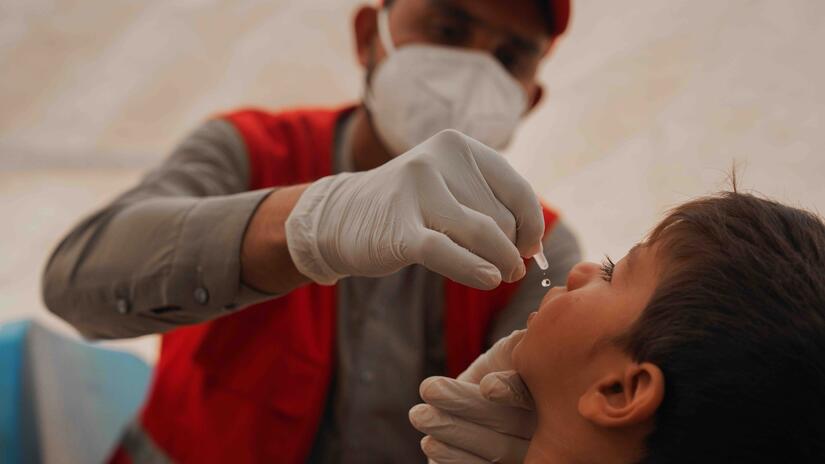
Small children are particularly vulnerable to many infectious diseases. Here an Afghan Red Crescent mobile health team member gives oral polio vaccine to a small child in Helmand province.
Photo: Meer Abdullah Rasikh/IFRC
Vital support from partners
Afghan Red Crescent Society health facilities are supported by several partners, including the IFRC. For instance, in 2022 the IFRC provided funding for 47 mobile health teams which delivered primary healthcare and immunization services at least 500,000 people, among them women and children, in rural and remote areas of Afghanistan such as Taher’s district.
The 47 mobile health teams have so far operated in many remote provinces including Nangarhar, Kunar, Nooristan, Kandahar, Helmand, Urozgan, Parwan, Sar-e Pol, Bamyan, Paktika, Wardak, Nimrooz, Herat, Badghis, and Jawzjan in the past years.
Taher is certain that his family is now much safer after their visit to the Afghan Red Crescent mobile health unit.
“My wife and my children are precious to me, and I can't imagine my life without them,” he said. “When they get sick, I get so worried since I have previously lost a close family member because we were unable to reach a doctor in time.
“I can't express how grateful I am to the Afghan Red Crescent Society for sending a mobile health team to our village. They are providing life-saving help to people like us in remote rural areas where access to healthcare facilities is so constrained or totally non-existent."
In 2023, the IFRC supported the Afghan Red Cresent in administering more than 390,000 doses of vaccines to children under 59 months of age.
This included vaccinating more than 5,000 children in their second year of life (12 to 23 months of age) with measles vaccines as part of catch-up efforts, and giving some 46,000 oral polio vaccine doses to children aged between 24 to 59 months as part of intensive efforts to halt wild poliovirus transmission.
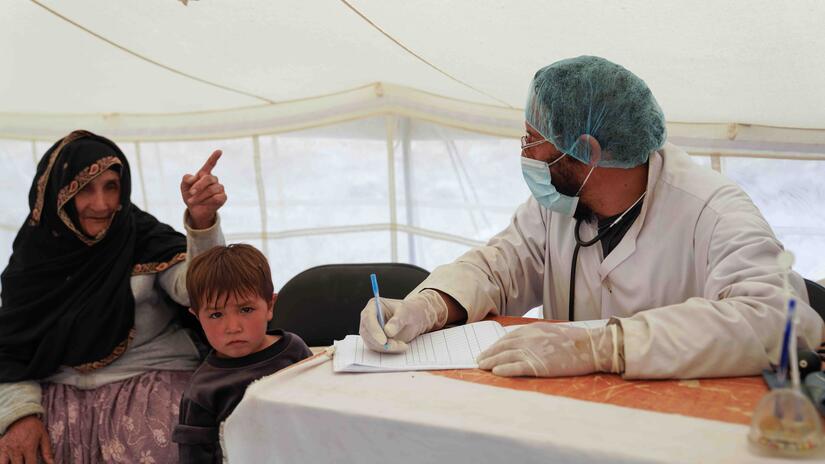
The Afghan Red Crescent mobile health teams also provide services in the wake of emergencies. Here a woman and child visit a mobile clinic following floods in July 2023 that affected nine provinces.
Photo: Meer Abdullah Rasikh/IFRC
IFRC’s support to the Afghan Red Crescent is part of its commitment, expressed in the IFRC Health and Care Framework 2023, to support National Societies in reaching “more than six million zero dose children globally and to reinforce both polio eradication efforts and routine immunization strengthening in multiple countries”.
National Societies and the IFRC work together to expand routine immunizations to children through integrated service delivery and community engagement approaches. Trusted local healthcare volunteers work within at-risk communities to ensure children receive life-saving vaccinations for preventable diseases such as polio, measles and cholera.
Words by Mir Abdul Tawab Razavy | Editing by Rachel Punitha

